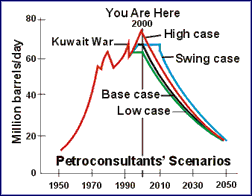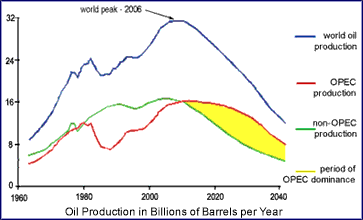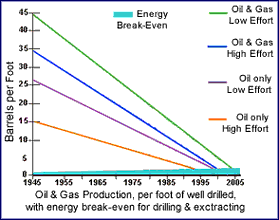Stephen James Kerr
Get out of the way. American capitalism has declared war on the laws of physics. Somebody please tell the president of the United States that whatever political and economic system we create, human beings cannot change the 1st law of thermodynamics. We can’t create energy from thin air. Big business may be able to swindle the American electorate, but it can’t repeal the law of diminishing returns.
Capitalism has developed, and our population has grown from one to six billion by drawing down a massive natural gift of energy in the form of cheap crude oil. It’s half gone. Since the mid 1990s Petroleum geologists have known that global oil production would peak in the first decade of the 21st century and decline forever thereafter. There is no adequate substitute for oil energy. The peaking of production means the further growth of energy demand, and thus of the global capitalist economy, is physically impossible. No energy - no economy.
Below is the scenario for world oil production predicted by Dr. Colin Campbell, in a report The World Oil Supply 1930 - 2050, written for Petroconsultants in Geneva in 1995. Petroconsultants, now IHS Energy is the biggest consulting firm to the oil industry. The report cost $35,000 per copy.

This is also the graph of our human future. All economies are energy dependent. No exceptions. Neither capital nor labour can create energy, but rather labour must harness energy to create and use capital. Exploiting an energy source has to return more energy than is expended in the process, or else it’s a waste of energy. As we spend more energy, at some point we start to get back less, despite all our efforts.
The depletion of our finite oil reserves is bringing more and more people in touch with this basic reality, and there is a growing movement to bring the meaning of this crisis to the centre of public debate. The unlikely intellectual heroes of this movement are a small collection of petroleum scientists, geologists and dissident economists from the oil industry.
Shell geophysicist and radical economic thinker M. King Hubbert pioneered the method used to calculate oil production peaks. The graph of production over time looks similar for specific wells, for nations, and for the whole earth. Hubbert discovered that depletion of oil resources over time follows a bell shaped curve, peaking when half the oil has been extracted. This is the ‘Hubbert curve.’
In 1956 Hubbert correctly predicted that US oil production would peak in 1970. Since the first oil shock in 1973, the USA has been transformed from a creditor into a debtor nation precisely because it has been forced to import more and more of its energy.
How accurate was the Petroconsultants 1995 prediction? It’s too early to tell for sure, but so far the data suggests that they scored a bull’s-eye. The Oil and Gas Journal and World Oil publish yearly production statistics. In 2000, world produced just over 67 million barrels of crude oil per day. According to Kenneth Deffeyes, a retired petroleum geologist from Shell, “2001 and 2002 didn’t produce as much as the year 2000. 2003 is not off to a great start, Venezuela has been off line, Nigeria’s been off line, Iraq is a mess as far as production is concerned and 2003 is not going to make it.” In 2002, global crude oil production declined to 65,946,000 barrels per day, according to the Oil and Gas Journal.
Colin Campbell predicted the impending production peak to the British House of Commons in 1999. “Discovery (of new oil reserves) peaked in the 1960s. We now find one barrel for every four we consume? No one can dispute that you have to find oil before you can produce it. The curve of discovery clearly has eventually to control the curve of production that follows it after a time lag.” That time is now.
Campbell understands the political importance of this fact. “By 2002 or so the world will rely on Middle East nations, particularly five near the Persian Gulf (Iran, Iraq, Kuwait, Saudi Arabia and the United Arab Emirates), to fill in the gap between dwindling supply and growing demand. But once approximately 900 billion barrels of oil have been consumed, production must soon begin to fall.”
The Saudi Oil Minister knows it too. “In five or seven years, I believe this whole question of quotas is going to be academic. Demand is going to rise and people are going to struggle to get the necessary investments to provide the necessary supplies,” Ali al-Naimi said at a press conference in April.

Energy analyst Bill Powers knows it. According to Powers, Saudi Arabia’s “largest field, Ghawar, now produces over 1 million barrels of water a day along with its nearly 4.5 million barrels of crude. With Ghawar accounting for 60% of the country’s 7.5 million barrels per day of crude production, there is little hope Saudi Arabia can keep production flat if Ghawar continues to water out.”
Mathew Simmons, CEO of Simmons and Co, a global energy investment bank knows it. Simmons was a member of Dick Cheney’s Energy Task Force. “Without volume energy we have no sustainable water, we have no sustainable food, we now have no sustainable healthcare. What peaking does mean, in energy terms, is that once you’ve peaked, further growth in supply, is over? and the issue then, is the world’s biggest serious question,” he declared in April.
Former US Secretary of Sate James Baker III knows it. Strategic Energy Policy Challenges for the 21st Century was prepared by The James Baker III Institute for Public Policy and the Council on Foreign Relations, and presented to US Vice President Dick Cheney in April 2001. This report recommended a radical review of US policy towards Iraq. At the time the Baker report was written, the USA was purchasing on average 800,000 barrels of Iraqi oil per day, making Iraq America’s sixth largest supplier.
The Baker report notes that “a trend towards anti-Americanism could affect regional (Middle Eastern) leaders’ ability to cooperate with the United States in the energy area,” while further down noting Iraq’s growing popularity in the Arab world “for ‘standing up to the United States for ten years.’”
Baker recommended that “the United States should conduct an immediate policy review toward Iraq, including military, energy, economic and political diplomatic assessments,” and “sanctions that target the regime’s ability to maintain and acquire weapons of mass destruction.” The goal of this policy review - “to eventually ease Iraqi oil field investment restrictions.”
Bush knows it, but he won’t tell us about the real “mission accomplished” in Iraq. Presidential Directive 13303 holds American oil companies in Iraq immune from prosecution for their actions in Iraq, and in effect seizes Iraqi oil revenue for dispensation as the White House sees fit. Halliburton and other US oil concerns are now the beneficiaries of un-tendered Iraq contracts, and their profits are already soaring - and indemnified from lawsuits .This is about as free from investment restrictions as it gets.
Some super secret memos of Dick Cheney’s Energy Task force were recently revealed by the US group Judicial Watch, in the midst of a lawsuit against Cheney for full disclosure. They contained oil maps of Iraq, Saudi Arabia, Iran and the UAE, and an accounting of oil production contracts.
It’s common to say the Iraq war was ‘all about oil,’ but the true meaning of that statement is only revealed in world oil production trends. Production in North America is already on the decline, while OPEC and Middle Eastern producers will be able to maintain their peak levels for several more years before their wells start to run dry. This will give OPEC, mostly Muslim states, growing economic and political power - the power to use the price of oil as a political weapon against the United States.

This is the nightmare scenario for US capitalism. In 1973, OPEC stopped selling oil to the United States in protest of American support of Israel in the Yom Kippur or Ramadan War. Without a supply of cheap energy, the US economy went into deep recession. In the 70’s there were other ‘swing’ oil producers like Venezuela who could step in to fill the supply gap. Today total global energy supplies are set to decline, and our economy cannot grow beyond its energy budget. Our civilization will instead decline with its energy budget, while the president tells Americans to line their safe rooms with duct tape, and hug the children.
But nobody on earth is safe from the laws of physics, not even the Bush Cartel. As production declines, extraction efforts are subject to the law of diminishing returns. After the easiest to extract oil is gone, wells must be deeper, and ever more energy expended to maintain existing production levels.
According to Walter Yongquist, “The most significant trend in the US oil industry has been the decline in the amount of energy recovered compared to energy expended. In 1916, the rate was 28 to 1, a very handsome energy return. Today the rate is 2 to 1, and dropping.” By 2005, it will cost a barrel of oil energy to extract a barrel in the USA, and American domestic oil production will no longer be profitable.

The quality of the oil found is also declining. In August 2000 the International Energy Agency noted “Continuing high prices are not just a matter of refining capacity. Much of the new crude oil coming on the market is heavier and higher in sulphur than the light crudes usually used to make gasoline. It will be difficult and expensive to refine into gasoline, particularly gasoline meeting the new standards.” We’ve caught the biggest fish, and we’ve sucked the sweetest crude.
Though oil may indeed remain in the ground, at some point it ceases to be a resource, and becomes an energy “sink,” because it takes more energy to extract the oil than the oil contains. The available energy alternatives, mostly solar and wind power, offer only diluted energy substitutes (not as powerful a fuel source as oil) and the US elite is unwilling to make an organized transition to renewable energy, fearing the loss of social and economic control that such transition would entail. The American consumption boom must end, but who will tell the people?
This is the secret ticking time bomb under the feet of Dick Cheney and George W Bush. The US has 3% of world energy resources, but uses 28% of those resources, and the USA is no longer geographically situated to exploit them. Oil is capitalism’s crack cocaine, and the Bush gang is waging a turf war to keep it coming.
With this understanding of oil production trends, the seemingly insane actions of the Bush White House reveal a consistent, if desperate internal logic - the US ruling class embarks upon its strategy of global Empire out of desperation at its incredibly weak underlying position. American capitalists feel compelled to rule oil producing nations like Iraq, Saudi Arabia and Iran as direct colonies in order to stave off their own collapse. It’s a strategy adopted by Imperial Rome, the British Empire, and others, but investments in Empire are also subject to the law of diminishing returns.
In order to conquer and hold its Empire, American capitalism must increase its investment in the military, an organization which cannot account for one trillion dollars of its own spending. Bush’s Pentagon budget is the biggest in history - over $400 billion per year, but so is the $455 billion US budget deficit. The Washington Post recently noted that “The defense budget is set to grow over the next few years faster than the forecast growth in the economy.” How long is America going to shut down schools to build bombs? Ultimately investments in the military must be accounted for as investments to control and extract resources, the most important of which is oil energy.

The American created ‘Cold War’ spent the Soviet Union into the ground. The peak oil crisis - the so-called ‘war on terror’ - will do the same for America and the globalized industrial economy. No campaign of precision bombing can stop this process of American decline.
Over time, the investment in Empire - soldiers, bombs, bureaucratic administration, prisons - required just to maintain the energy flow into the capitalist economy will exceed the net energy return on that investment, in fact such a point may come sooner than later. After the American attack on already devastated Iraqi oil infrastructure “Iraq is planning to export only 8 million barrels of oil in July a small fraction of its pre-war output,” according to the International Herald Tribune.
Factor in the effective loss of the number six US oil supplier (Iraq) with the staggering stupidity of a US Congress so in bed with big oil and big auto that it steadfastly refused to raise fuel efficiency for US cars this week - insisting instead on the patriotic waste of fuel - and one gets a glimpse into the American oil economy brain trust.
American desperation can also be seen in the latest statement of the US Commerce department. “The strongest wave of federal defense spending since the Korean War helped fuel U.S. economic growth at a stronger-than-expected 2.4 percent annual rate in the second quarter?” it informs us. This is tragedy, though the US government paints it as an indicator that “The economy truly does look to be on the mend.” Apparently the military state has now supplanted the market as the driver of the US economy, under a ‘free market’ administration. This ‘growth’ will create few jobs, yet provide the means to kill many more surplus workers - victory over terrorism surely.
Each passing day on the 120 degree sands of Iraq reveals America’s imperial overstretch. Iraqi guerrilla resisters kill American soldiers daily, while the survivors demand to know why they can’t go home. There are many reports of vicious abuses conducted by American troops, and hundreds of unreported deaths and injuries. Over half of the US armed forces are committed overseas, ‘bringing democracy’ we are told, and there is talk now in Washington of a bigger US Army to meet the rapacious demands of the new imperial strategy. That means a draft of surplus male workers, increased repression and resistance.
As for the battle of ideas - tens of millions against the war on the streets of the world and the demonstrations in Iraq today prove that our hearts and minds were set against the Empire before the first shot was fired. Even the Democrats are waking up. And so now in Washington there is a great falling out among thieves as it all unravels.
The aftermath of the Bush government’s refusal to de-classify 28 pages of incriminating information in the Congressional report on the terrorist attacks of 9-11 must now crack wide open a public debate about the consequences of American oil dependency. Though Saudi government agents likely had a hand in the plot, the United States did not dare attack its most important oil supplier until it was better prepared. Did Karl Rove think it better to make regime change in Saudi Arabia in 2004, from secure bases in Iraq and Afghanistan, and right in time for an election draped in khaki bunting? We shall see.
The Imperial strategy will fail for America just as it failed for Rome. Joseph Tainter notes that “As the marginal return on investment in Empire declined, major stress surges appeared that could scarcely be contained with yearly imperial budgets. The Roman Empire made itself attractive to barbarian incursions merely by the fact of its existence.”
It truly is “d?j? vu all over again.” Today, the US Army describes itself in Iraq as “a magnet for terrorism,” while it is becoming clear to many that American policies are not making Americans safer, but rather endangering the entire planet as America’s increasing energy dependence to maintain its obscene consumption levels demands the violent expropriation of the wealth of other societies; ultimately futile investments in death. The sack of Rome ushered in a long era of decline that historians call ‘The Dark Ages.’ Faced with the onset of another such age, we must organize against the American government plan to “bring it on.”
Stephen James Kerr is an investigative reporter and analyst based in Toronto, and the co-host of Newspeak, a news radio show on CIUT 89.5 FM. The above graphs were based on those found at DieOff.com
Courtesy of ZNet.